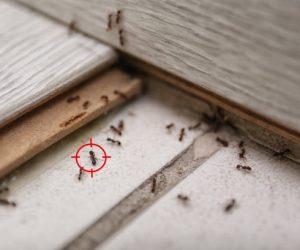Pests can be a nuisance and pose risks to both our homes and health. Pests include insects, such as ants, mosquitos, and cockroaches to rodents such as mice and rats. Therefore it is important to take proactive measures to control and eliminate these unwanted intruders. We all want to keep our homes safe and free from pests. Therefore, ensuring that you have effective methods for a bug-free property we are the trusted experts for worry-free, safe, and effective pest control solutions for commercial and residential pest control. This article will explore effective pest-control strategies that can help you to maintain a pest-free environment.

What are common household pests:
When it comes to household pests, there are a variety of unwelcomed visitors that can cause havoc in your home, these pests can pose health risks and damage to your property if left unchecked.
Common pests include, but are not limited to:
- Termites
- Silverfish
- Spiders
- Stored product pests
- Ants
- Bed bugs
- Birds
- Cockroaches
- Fleas and ticks
The importance of Year-Round pest protection for your home:
Having year-round pest protection is essential to minimize the risks of illnesses transmitted by pests and bugs, ensuring a healthier living environment for your family, it also plays a crucial role in averting potential house fires and costly termite-related damages.
As pests usually multiply rapidly, proactive pest prevention measures are paramount to stop infestations before they become unmanageable. Furthermore, as many pests remain active during colder months, regular inspections are imperative to detect signs of their presence and prevent them from entering your home.
What are the most effective pest control strategies that can help you maintain a pest-free environment:
Regular cleaning and maintenance:
Keeping your home clean and organized is one of the easiest ways to control pests. Cleaning surfaces and floors frequently will help to get rid of food particles and other waste that serves as magnets for bugs. Additionally eliminating insect access points can be done by ensuring that you have the appropriate waste disposal systems in place, repairing leaky pipes and caulking cracks and fissures in the walls.
Eliminate food and water sources:
Pests are often drawn to areas that have access to food and water. Therefore storing your food in proper food storage, airtight containers and promptly cleaning up spills can prevent pests from gathering in your kitchen. Ensure that pet food is also stored securely and not left overnight. Fixing leaky faucets and eliminating standing water can also discourage pests such as rodents and mosquitos.
Seal entry points:
Inspect your home for potential entry points that pests can use to gain access. Check for gaps around windows and doors and or cracks in the foundation. Seal these gaps with the appropriate materials to prevent pests from entering your home.
Outdoor maintenance:
Pests often originate from the outdoor environment and are able to make their way indoors. Therefore ensuring that you keep your yard well-maintained by regularly mowing the grass, trimming shrubs, and removing debris will help eliminate unwanted pests. Try to store firewood away from the house and clear away any stagnant, standing water.
Professional pest control:
In severe cases or when facing persistent pest infestations, it may be necessary to seek professional pest control services. Pest control experts have the necessary knowledge and experience to identify and address the specific pest problems that you are facing effectively. Pest control specialists can employ various methods such as using insecticides, traps, and bait stations to eradicate pests while ensuring minimal impact on human health and the environment.
Integrated pest management (IPM):
Integrated pest management is an environmentally friendly and sustainable approach to pest control. It involves combining strategies to prevent and control pests and focuses on long-term solutions rather than relying solely on chemical treatments.
Maintaining a pest-free environment requires a proactive approach that combines good hygiene practices, regular maintenance, and preventative measures. By following the above strategies you will be able to significantly reduce the likelihood of pest infestations and enjoy a clean and pest-free home. However, should the problem persist or become overwhelming it is advisable to seek professional advice and assistance to ensure effective pest control while ensuring your health. Safety and well-being. By implementing practical and efficient strategies such as regular pest control maintenance and personalized protection plans, homeowners can ensure a healthy living environment for themselves and their relatives.



